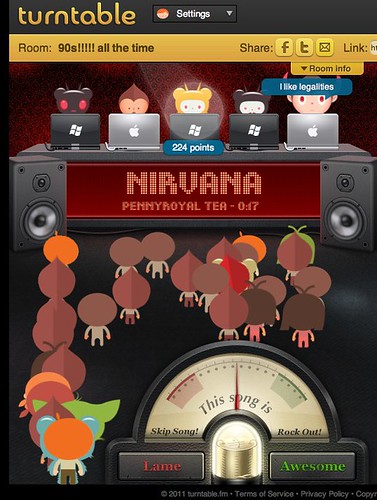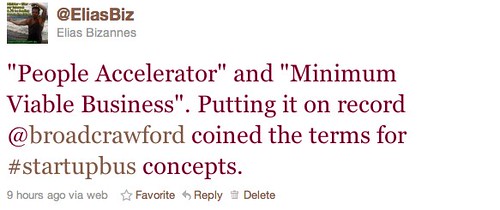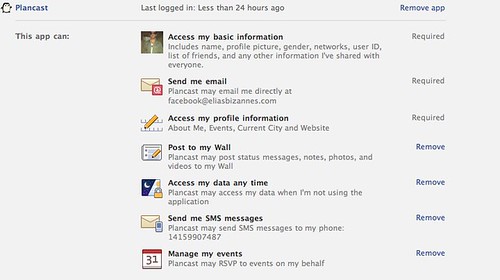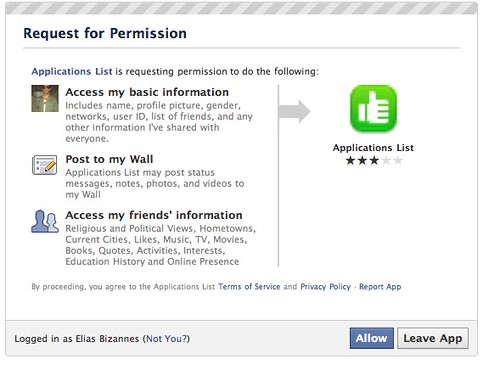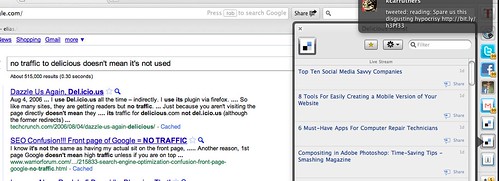Three weeks ago, Turntable.fm became the hype in the echo chamber. Like I do with everything, I’m been observing and reflecting on how it’s being used by other people and myself. In short, I like it. It’s such a simple idea that could further disrupt the traditional radio business.
What it is
For the uninitiated, it’s an an Internet radio station, with a quirky web page that people interact in. People either sit in the room bopping their heads (approving the music) or people put themselves in the DJ chair and compete against another 4 DJ’s for the best tunes according to the room theme.
My first observation: Spotify will kill it. Or not.
While they appear to be completely different, I keep thinking about my Spotify experience a year ago when I was in Europe: I was hooked. And it was for the same reason — I could subscribe to a friends playlist (turntable I can follow a friend and hear when they play). The benefit is that I can get filtered serendipity and discovery, like how radio has done for decades. (For example, you may love a particular kind of music but have no idea what the latest tracks are or the time to curate playlists — but you have friends who do so would rather follow their enthusiasm.)
Turntable’s cool, but I keep thinking it’s Myspace and Spotify is Facebook. When Spotify launches in the US (rumoured to finally be this month), then turntable’s core value in providing this discovery will be replaced as Spotify is just an amazing service. But I’m not so sure about that now, as actually it might be away where playlists in Spotify get generated so it’s completely complementary.
My second observation: it’s competitive curation
In this explosion of social media, people are starting to appreciate the role editors played in the traditional media. Curated content is a skill that algorithms still can’t beat humans at (and actually, the best kinds are based off existing human preferences).
With Turntable, you select a room and sit there listening to the music. People compete for the “DJ” spot at the table (of which there are a maximum of 5). A chat room allows people in the room to chat like the old days of IRC and give direct feedback to the DJ’s or discuss music. The vote meter helps regulate the quality of music as high votes not only impact the DJ’s rating but down votes can cut the song being played and move onto the next DJ’s track.
This motivation to please the crowd means there is an active effort to curate the playlists into something worthwhile. That’s an interesting concept to consider, as playlists in past have tended to be done by people along without real consideration of others listening to it (or at least, real time feedback to consider it).
My third observation: it’s social, like the Athenian assembly social

I don’t fully understand why yet, but the chat room aspect is the most powerful component of the experience despite being the most subtle. While the voting mentioned in my second observation creates a motivation to enhance their DJ reputation by playing good music, the chatroom makes this curation directly in touch with the audience.
It’s like a democracy, where those representing and controlling the room’s music are actually completely dependent on the goodwill of the audience. The voting is the main way this is enforced, but the chatroom is where people will negotiate. Games will be determined where certain patterns in music will be played; feedback of bad songs will be given to DJ’s; and requests will be sent. It’s like a radio station completely accountable to its audience.
Like Twitter, the service will evolve based on these discussions. Some of Twitter’s most useful features like @ replying (which turned it into a communications tool) and hashtags (which turned into into a information resource) were invented and popularised by their most passionate users. Turntable.fm offers a similar utility around music and I think will evolve in a similar way. Like any startup, it’s hard to know where turntable.fm will be in six months time, but one things for sure: it’s sticky and it’s only going to get better.
